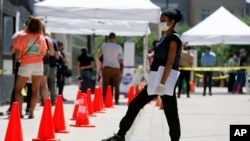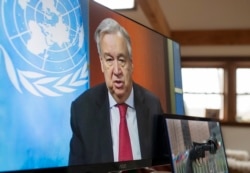U.N. Secretary-General Antonio Guterres warned Thursday that the coronavirus pandemic is profoundly affecting peace and security worldwide.
“Collective security and our shared well-being are under assault on many fronts, led by a relentless disease and abetted by global fragilities,” Guterres said. “Our challenge is to save lives today, while buttressing the pillars of security for tomorrow.”
The U.N. chief addressed a virtual high-level meeting of the U.N. Security Council to discuss the effect of the pandemic on peace and security. More than 10.5 million people worldwide have been confirmed to have COVID-19, the disease caused by the new coronavirus.
“The consequences can be seen even in a number of countries traditionally seen as “stable,” he said. “But the impacts are particularly apparent in countries already experiencing conflict or emerging from it and may soon engulf others.”
Guterres said tensions are rising as a result of the severe socioeconomic fallout of the health crisis and the erosion of public trust in countries where the people feel the response has been ineffective or lacked transparency.
With some 100 armed conflicts raging around the world, peace processes are at risk, particularly if the international community is not fully engaged.
“In other places, conflict actors — including terrorist and violent extremist groups — see the uncertainty created by the pandemic as a tactical advantage,” Guterres said.
He noted that in many places, health care workers and humanitarians who are aiding the sick and those impacted by the virus have been targeted for attack.
Guterres warned of growing signs of authoritarianism, including restrictions on the media, civic space and freedom of expression, as well a rise in hate speech and an “epidemic” of online misinformation.
“Populists, nationalists and others who were already seeking to roll back human rights are finding in the pandemic a pretext for repressive measures unrelated to the disease,” he cautioned.
Guterres said these wide-ranging risks require an urgent and united response, including from the Security Council, and he welcomed their endorsement Wednesday of his call for a global cease-fire to support the coronavirus response.





